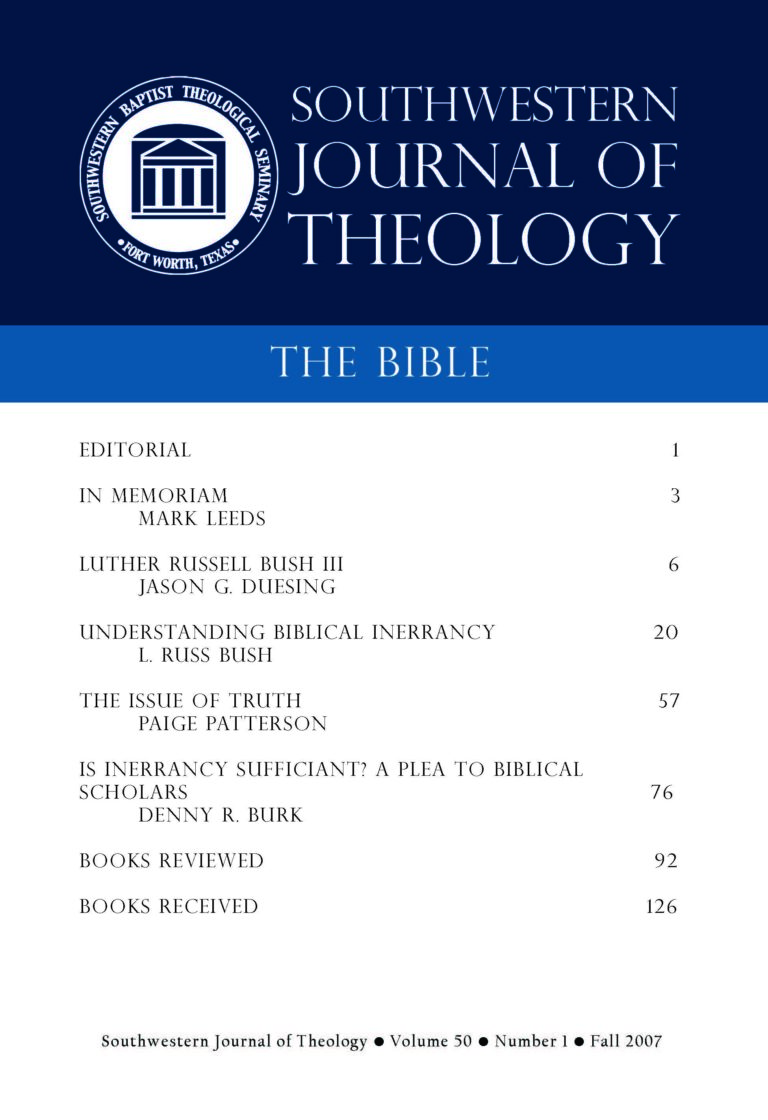
The Bible
Southwestern Journal of Theology
Volume 50, No. 1 – Fall 2007
Managing Editor: Malcolm B. Yarnell III
By John Perry. Nashville: Broadman and Holman, 2005. 256 pages. Hardcover, $19.99.
With the recent retirement of James Draper from LifeWay, this biography of his life, by John Perry is timely, well-researched, and enjoyable to read. Perry is an accomplished writer with experience in writing biographies, including those of Charles Colson, Sgt. Alvin York, and Mrs. Robert E. Lee.
Walking God’s Path provides a candid and direct look at Draper’s impressive career and ministry from the successes of his early pastorates to his turbulent times at the First Baptist Church of Dallas; and from his refusal to change in Southern Baptist’s theological battles to the changes he led at LifeWay. The author handles sensitive issues with honesty and clarity, yet with sensitivity and fairness to all involved. Readers will be struck by the clear hand of God’s providence that is evident throughout Draper’s life.
Perry is more than an impersonal chronicler of Draper’s life and ministry. Throughout the book, the admiration of the author toward the subject of his work is evident. Perry traces Draper’s career from his early days at Baylor University, where he served on preaching teams with Chuck Swindoll and others to his successful pastoral career before transitioning to LifeWay.
Fewer details are given of Draper’s pastorates in Iredell Baptist Church, Temple Baptist Church in Tyler, University Park in San Antonio, Red Bridge in Kansas City, Del City in Oklahoma City, and the First Baptist Church of Euless, while careful attention is given to Draper’s two eventful years on staff at the First Baptist Church of Dallas. Perry candidly recounts the events leading up to Draper’s disappointments with Criswell and eventual conflict with Mrs. Criswell. Perry points to Criswell’s naivety and Mrs. Criswell’s jealousy as largely to blame for the departure of Criswell’s probable successor.
Perry also describes Draper’s role in the conservative resurgence of the Southern Baptist Convention. Perry highlights Draper’s service on the Board of Trustees for the Annuity Board, Baylor University, and Southwestern Baptist Theological Seminary. The author examines Draper’s role in the controversy at Baylor University as well as the impact of Draper’s book, Authority: the Critical Issue for Southern Baptists, written to combat the work of Russell Dilday and others whose writings espoused a more moderate view of scriptural authority.
Perry credits Draper with the restoration and much of the recent success at LifeWay, pointing to his pastoral style that helped ease the road for the many changes from leadership style and focus, to store operations, to the name change, and finally LifeWay’s national impact. Perry concludes with an optimistic promise that Draper’s ministry is not completed, just transitioning again.
At several points along the journey, Perry points to key individuals who played important roles in encouraging and assisting Draper. Among those included Billy Graham, Luther Dyre, Youth for Christ, John Bisagno, and Paige Patterson.
Perry has done an excellent job capturing the passion of one of Southern Baptists’ great leaders and statesmen. Readers will be reminded of Draper’s consistent stand on the authority and inerrancy of God’s word and a refusal to compromise that will serve as a lasting challenge for countless young leaders of faith today. Pastors and Christian leaders will be blessed to learn of an anointed leader through the hands of a gifted writer.





